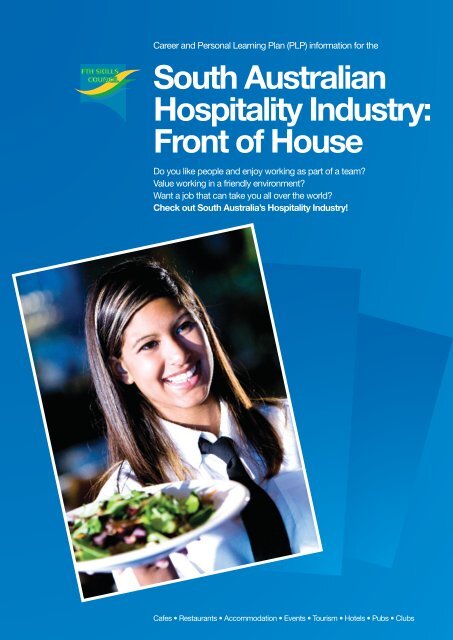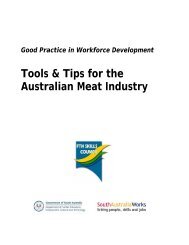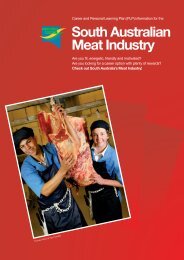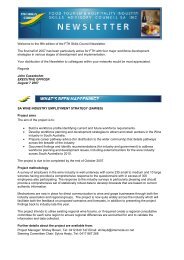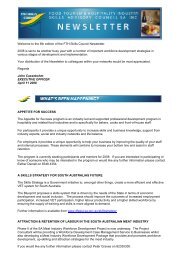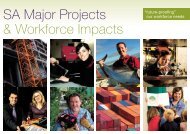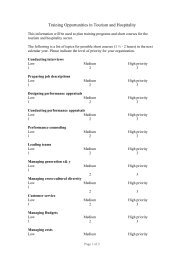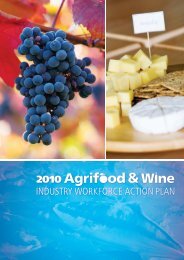Front of House - FTH Skills Council
Front of House - FTH Skills Council
Front of House - FTH Skills Council
- No tags were found...
You also want an ePaper? Increase the reach of your titles
YUMPU automatically turns print PDFs into web optimized ePapers that Google loves.
Career and Personal Learning Plan (PLP) information for theSouth AustralianHospitality Industry:<strong>Front</strong> <strong>of</strong> <strong>House</strong>Do you like people and enjoy working as part <strong>of</strong> a team?Value working in a friendly environment?Want a job that can take you all over the world?Check out South Australia’s Hospitality Industry!Cafes • Restaurants • Accommodation • Events • Tourism • Hotels • Pubs • Clubs
South Australian hospitality Industry2
4556789101113141718Achieving South Australian Certificate <strong>of</strong>Education (SACE) – what does this mean?Vocational Education and Training (VET)and the SACE VET Recognition RegisterVocational Education and Training (VET)in SACE for the Hospitality IndustryTraining options available and pointsyou should considerIndustry RecommendationSchool to work - How to startexploring career optionsYes – It is all about me!Appropriate trainingWhy work in Tourism or Hospitality?Check out what your new bosswill be looking for!School to work - Career OptionsTestimonialsFurther informationSouth Australian hospitality Contents Industry3
South Australian hospitality IndustryAchieving South Australian Certificate <strong>of</strong>Education (SACE) – what does this mean?Each subject or course successfully completedearns ‘credits’ towards the SACE. At least 200credits are required for students to gain thecertificate. Ten credits are equal to one semester,or two terms, <strong>of</strong> study in a subject, and 20 creditsare equal to a full-year subject. To gain their SACE,students generally complete two years <strong>of</strong> full-timestudy. There are two stages to the SACE: Stage 1,which most students do in Year 11 (apart from thePersonal Learning Plan, which most students arelikely to do in Year 10) and Stage 2, which moststudents do in Year 12.The compulsory SACE requirements are:• Personal Learning Plan (10 credits at Stage 1)• Literacy – at least 20 credits from a range <strong>of</strong>English subjects or courses (Stage 1 or Stage 2)• Numeracy – at least 10 credits from a range <strong>of</strong>mathematics subjects or courses (Stage 1 orStage 2)• Research Project – an in-depth major project (10credits at Stage 2)• Other Stage 2 subjects totalling at least 60 creditsThe remaining 90 credits can be gained throughadditional Stage 1 or Stage 2 subjects or VocationalEducation and Training (VET) or SACE Boardrecognisedcourses <strong>of</strong> a student’s choice.Personal Learning Plan (PLP) – 10 pointsThis compulsory subject is the first step in theSACE and is usually undertaken in Year 10(although each school decides when to <strong>of</strong>fer thissubject). In the Personal Learning Plan, studentsexplore subject choices for Years 11 and 12 andlook at career options. To prepare for these goals,students also look at their strengths and areas inwhich they need to improve. To help you with yourPLP, <strong>FTH</strong> <strong>Skills</strong> <strong>Council</strong> has created a range <strong>of</strong>career documents that are available to downloadfree from our website www.fthskillscouncil.com.au/resources. Information is available for the followingsectors:Year 11 is usually the first full year <strong>of</strong> SACE study.Students are able to choose from the range <strong>of</strong>SACE Stage 1 or Stage 2 subjects <strong>of</strong>fered by theirschool. In addition to the Personal Learning Plan,students usually complete two other compulsoryrequirements in Year 11 - a full year <strong>of</strong> Englishsubjects and a semester <strong>of</strong> maths, both atStage 1.Year 12 is usually the second full year <strong>of</strong> SACEstudy. Students are able to choose from the range<strong>of</strong> SACE Stage 1 or 2 subjects <strong>of</strong>fered by theirschool. The only compulsory subject in Stage 2is the Research Project. This is a one semester(or 10 credit) subject which everyone has tocomplete. The Research Project will allow studentsto explore something in which they are deeplyinterested – it could be an art project, a scientificstudy, a community-based project, or any number<strong>of</strong> other options.In Year 12, most students will do four, full-yearStage 2 subjects in addition to the ResearchProject. Students interested in applying foruniversity or TAFE entry will need to meet certainrequirements or prerequisites. Make sure youconsider these requirements in Year 10 whenchoosing your SACE Stage 1 and SACE Stage 2subjects. Please note: Vocational Education andTraining may not count towards your ATAR.4
Vocational Education and Training (VET)and the SACE VET Recognition RegisterVET is not about learning to look after animals.Vocational Education and Training is about learningthe skills required for a job. VET Qualifications are acombination <strong>of</strong> units <strong>of</strong> competency and the trainingis provided by Registered Training Organisations(RTOs). Each unit <strong>of</strong> competency has nominalhours allocated to it and SACE credits are availablefor each unit <strong>of</strong> competency towards a qualificationthat you successfully complete.Vocational Education and Training (VET) inSACE for the Hospitality IndustryAs we mentioned earlier VET is not about learning tolook after animals. VET in SACE for the HospitalityIndustry is the recognition <strong>of</strong> successful completion<strong>of</strong> Hospitality units with the allocation <strong>of</strong> SACEcredits. VET is the kind <strong>of</strong> education <strong>of</strong>fered byTAFE colleges and other Registered TrainingOrganisations. VET courses lead to industryrecognisedqualifications, generally at Certificate IIor III level.A student will earn 10 SACE credits for thesuccessful completion <strong>of</strong> 70 nominal hours <strong>of</strong> VETup to the maximum number <strong>of</strong> credits allocated toeach qualification. Students can gain recognitionfor up to 180 SACE credits at Stage 1 and/orStage 2 for successfully completed VET units orqualifications.Code Qualification Job Title Nominal hours -how long trainingshould takeSACE creditsfor completedqualificationSIT10207 Cert I Hospitality n/a 120-260 15-35 Stage 1SIT20207 Cert II Hospitality Food & Beverage Attendantor Guest Services AttendantSIT30707 Cert III Hospitality Food & Beverage Attendantor Guest Services Attendant181-700 25-100 Stage 1293-990 40-140 Stage 1 & 2Refer to the VET Recognition Register on the SACE website www.sace.sa.edu.au for details <strong>of</strong> how specificVET qualifications can earn SACE credits at Stage 1 and/or Stage 2.Studying VET as part <strong>of</strong> your SACE is a good optionfor many students as it can give you a head-starton a qualification, which can be a great way to gainthe skills required for work but there are things youneed to be aware <strong>of</strong> and consider if you are planningon undertaking VET studies as part <strong>of</strong> your SACE.If you are considering VET as part <strong>of</strong> your SACEyou must talk to your Schools Career Advisor andensure you choose enough subjects to still completeyour SACE.South Australian hospitality Industry5
South Australian hospitality IndustryTraining options available andpoints you should consider...Australian School Based Traineeship:• Enter into a Contract <strong>of</strong> Training (COT) with anemployer or group training provider while you arestill at school• Generally work a minimum <strong>of</strong> 1 day (8 hours)per week and attend a Registered TrainingOrganisation (RTO) 1 day per week• Attend school the remaining days and completeother SACE Stage 1 and Stage 2 subjects• Workplace Practices – Consider choosingWorkplace Practices as a subject (SACE Stage1 and Stage 2). You will still need to completeassignments and provide evidence <strong>of</strong> your VETlearning but this can be based on your workplacelearning that you are doing everyday as part <strong>of</strong>your ASBA• You get paid for the work that you are doing andmay be able to work extra hours as welle.g. weekends and school holidaysREMEMBER you will only get SACE credits forthe VET units that you actually complete.Australian Traineeship:• Enter into a Contract <strong>of</strong> Training (COT) with anemployer or group training provider after youfinish school• Generally work full-time and attend a RegisteredTraining Organisation (RTO) 1 day per week or forblocks <strong>of</strong> training• After successful completion <strong>of</strong> your Traineeshipyou will have the skills to work in industry as aFood & Beverage Attendant or Guest ServicesAttendantDirect enrolment with Registered TrainingOrganisation (RTO):• Enrol with a RTO and pay for your own training• Receive SACE credits for the VET units yousuccessfully complete• If you only do a few VET units as a “taster” <strong>of</strong> theindustry you may get an idea if you actually likethis type <strong>of</strong> work or not• Ensure you have sufficient work placement andexperience to practice on-job the skills you aremeant to be learningGet a job:• Have you thought about a part time job while youare still at school?• You get paid for the work that you are doing andlearn new skills• Most employers will provide training on-the-jobREMEMBER you may not complete any formalVET training, so you may not get any SACEcredits for your on-job learning.6
IndustryRecommendationThe most important thing to remember is that youwill not be able to work with alcohol or in gamingareas until you are 18 years old. If you are under 18you can still work in the industry – but you need towork in the appropriate area or location. CertificateI Hospitality will give you a “taster” <strong>of</strong> the industry tosee if you like it.Certificate II Hospitality & Certificate III Hospitalityare both linked to the job outcome <strong>of</strong> a Food &Beverage Attendant or Guest Services Attendant.Consider this option if you aren’t sure about whatyou really want to do as this should give you theskills to help you get a job as a Barista, Barperson,Glassy or Food & Bev Assistant/Attendant in a Café,Hotel, Restaurant or Club. Traineeships are availablewhich ensures you are paid for the work you do,along with formal training and workplace experience.South Australian hospitality Industry7
Yes – It is all about me!You probably have enough people telling you whatto do and what not to do. All we are asking you todo is think - think about where you want to work,think about what sort <strong>of</strong> jobs you might do and thinkabout what training is appropriate for YOU. That’sright - for once - IT IS ALL ABOUT YOU! Thetraining that you complete needs to be appropriatefor your age and the location where you want towork - you will not be able to work with alcohol orin gaming areas until you are 18 years old.-18If you are under 18 the jobs and training appropriatefor you would be:Food and Beverage Assistant in a Café, Hotel,Restaurant or Club• Prepare and serve non alcoholic beverages• Serve food and beverages to customers• Prepare and serve espresso c<strong>of</strong>feeBarista in a Café• Prepare and serve espresso c<strong>of</strong>feeGeneric units suitable for all jobs would include• Work with colleagues and customers• Follow health safety and security procedures• Follow workplace hygiene procedures• Process financial transactions18+If you are 18 or older - all <strong>of</strong> the jobs and trainingfrom the “under 18” list plus the following:Barperson or Mixologist in a Hotel, Restaurantor Club• Clean and tidy bar areas• Operate a bar• Prepare and serve cocktails• Evaluate wines (standard)Food and Beverage Assistant in a Hotel,Restaurant or Club• Provide table service <strong>of</strong> alcohol• Provide food and beverage service• Prepare and serve espresso c<strong>of</strong>fee• Evaluate Wines (standard)Gaming Attendant in a Hotel or Club• Process financial transactions• Provide responsible gambling services• Attend gaming machines• Conduct a Keno gameGeneric units suitable for all jobs would include• Provide responsible service <strong>of</strong> alcohol• Work with colleagues and customers• Follow health safety and security procedures• Follow workplace hygiene procedures• Process financial transactionsAll <strong>of</strong> these jobs are great stepping stones toa career in the Hospitality industry. Check outthe Tourism & Hospitality Career Guide for moreinformation. Free download is available from theResources pages <strong>of</strong> the <strong>FTH</strong> <strong>Skills</strong> <strong>Council</strong>website www.fthskillscouncil.com.auSouth Australian hospitality Industry9
South Australian hospitality IndustryDon’t waste your time and money doing trainingthat isn’t appropriate for you.You can complete training at any age but youshould leave the alcohol and gaming training forwhen you’re 18 - you won’t legally be able to usethese skills in a job until then. So why bother? Thefollowing is a list <strong>of</strong> training units for the Hospitalityindustry. It’s not an exhaustive list, just somethingfor you to think about.-18I am under 18• Prepare and serve espresso c<strong>of</strong>fee• Follow workplace hygiene procedures• Work with colleagues and customers• Serve food and beverage to customers• Prepare and serve non-alcoholic beverages• Process financial transactions• Provide quality customer service• Develop and update hospitality industryknowledge• Follow health, safety and security procedures• Apply food and beverage skills in the workplace• Apply hospitality skills in the workplace• Work in a socially diverse environment• Apply point <strong>of</strong> sale handling procedures• Develop and update food and beverageknowledge18+I am nearly 18 or older• All the training from the “I am under 18” list PLUS• Provide responsible service <strong>of</strong> alcohol• Provide food and beverage service• Clean and tidy bar areas• Operate a bar• Prepare and serve cocktails• Evaluate wines (standard)• Provide table service <strong>of</strong> alcoholic beverages• Operate cellar systems• Provide responsible gambling services• Operate a TAB outlet• Conduct a Keno game• Attend gaming machinesYou get the idea. The hospitality industry is alwayslooking for good staff. Just remember - you can notwork with alcohol or in gaming areas until you are18 years old. You have great training opportunitiesavailable - just think about what is appropriateFOR YOU.If you are training while at school rememberyou will only get SACE credits for the units thatyou actually complete. You may not completea full Certificate II or III so will not get the fullSACE credits detailed on the VET register.If you are considering VET as part <strong>of</strong> your SACEyou must talk to your schools career advisor andensure you choose enough subjects to still completeyour SACE.10
Why work in Tourism or Hospitality?A job you can beproud <strong>of</strong>South Australian Hotels, Clubs, Pubs, Cafes,Caravan Parks and Tourist Attractions have wonnational awards for excellence in the way theyconduct their business - and they all make a hugecontribution to South Australia’s economy.TourismIn 2007 5.8 million visitors stayed 26.3 million nightsin SA and generated $4.2 billion expenditure acrossour state. The tourism industry sustains almost 4%<strong>of</strong> all SA jobs and employees many thousands<strong>of</strong> people, equivalent to 28,000 full time jobs.EventsSA, ‘the Festival State’, is internationally recognisedfor its success in hosting major events, such asTour Down Under; Clipsal; WOMADelaide; AdelaideFestival <strong>of</strong> Arts; Adelaide Cup; Adelaide Fringe;Writers week; etc.Hotels, Pubs and ClubsThere are 630 Hotels in SA, employing 24000people and serving 28 million meals a year (apartfrom 80 million litres <strong>of</strong> beer and 12 million litres <strong>of</strong>wine). 350000 people are members <strong>of</strong> more than1200 Licensed Clubs in the State that produce anannual turnover <strong>of</strong> $214 million and spend morethan $47 million on wages to more than 2500people (another 1750 people are employed indirectlyand there are many thousands <strong>of</strong> volunteers).Restaurants and CafesThere are 1027 Licensed Restaurants and Cafesin SA and an unknown number <strong>of</strong> unlicensed foodservice operations employing more than 15,000people and turning over more than $500 million.AccommodationSA <strong>of</strong>fers more than 13000 rooms to visitors inHotels, Motels and Serviced Apartments andthere are more than 140 large Caravan Parks<strong>of</strong>fering more than 20000 sites or cabins. TheState is also renowned for a full range <strong>of</strong> alternativeaccommodation in Bed & Breakfasts; Farmstays;Vineyard; Cottages & Cabins; Backpackers &Hostels; <strong>House</strong>boats and Resorts.In shortThe Tourism & Hospitality industry is really importantto South Australia! However, the industry does morethan generate jobs and expenditure - it showcasesto the world the States fine wine; fresh qualityfood; excellent accommodation, and national andinternational events. You’ll feel proud to say youwork in the South Australian Tourism and Hospitalityindustry.Great trainingopportunitiesThe Tourism & Hospitality industry is jam-packedwith training opportunities - from short coursesthat can take just a few hours to complete; toTraineeships; and all the way up to a three yearBachelor Degree. Throughout most training optionsyou can earn while you learn - and the qualificationsyou attain will be nationally recognised - andinternationally in many instances!South Australian hospitality Industry11
South Australian hospitality IndustryWhy work in Tourism or Hospitality?Job varietyThere are hundreds <strong>of</strong> different jobs in Tourism &Hospitality - and many <strong>of</strong> them are based on thesame “core competencies”. That means you don’thave to leave the industry when you feel the need fora change. The wide range <strong>of</strong> training opportunities -both on-the-job and through other options - meansyou can continue learning and upgrade your skills tomove laterally or diagonally across career fields.Exciting, social,teamwork environmentTourism & Hospitality is a vibrant and excitingcommunity. The industry is fast moving, withconstant change, so it’s never boring. The peoplewho work in it are generally interesting, social peoplewho have interesting challenging jobs. Sure! There’llbe ‘shifts’. Many jobs in the industry fall outside thefixed nine-to-five structure - but there are socialbenefits to this, both within the work teams and inthe flexibility you’ll have for your personal lifestyle.Work part time orfull timeYou can choose to work part-time while you study,or full-time while you learn on-the-job. Becausemany jobs have peak demand hours, some peoplework in more than one part-time job to give afull-time week. This not only gives you flexibility inplanning your work/life balance, it gives on-the-jobvariety and keeps life interesting.Long term securityThere’s always going to be a demand for Hospitalityemployees. The industry is growing - and thatgrowth is expected to continue.A job that can takeyou worldwideNot everyone wants to travel - but if you do, thisindustry is the one for you. Armed with recognisedqualifications and experience in the AustralianTourism & Hospitality industry, you’ll be welcomealmost anywhere in the world.12
Check out what your new boss will belooking for!What are prospective employers in the HospitalityIndustry looking for in their employees? Remember:This is not a checklist but an example so you canget an idea <strong>of</strong> what employers are seeking.Personal characteristics• Friendly, helpful and approachable• Responsible and reliable• Attention to detail• Good hygiene• Neat and tidy appearanceAbilities• Work in a team• Effectively manage your time• Punctuality• Work under pressure• Effective communication skills<strong>Skills</strong>• Able to prioritise tasks• Able to multi-task• Good hand and eye co-ordination• Use initiative• Follow instructions• Problem solvingWhat sort <strong>of</strong> activities you would do• Taking customer orders• Prepare and serve espresso c<strong>of</strong>fee• Preparing drinks• Serving food and drinks at a counter or bar• Serving food and drinks at tables• Clearing tables• Customer service• Working with a range <strong>of</strong> equipment and machinery• Continuous learningSouth Australian hospitality Industry13
South Australian hospitality IndustryTraining optionsCertificates I, II, III, IV, Diplomaand Advanced DiplomaThe Tourism and Hospitality Industry provides manydifferent opportunities for both formal and informallearning. There are pathways that progress at yourown pace through Certificates I, II, III, IV, Diplomaand Advanced Diploma (or as many <strong>of</strong> those stepsas you want to take) - or you can build your trainingthrough many Short Courses that are available atTAFE and other RTOs (some take just a few hoursto complete and others <strong>of</strong>fer classes <strong>of</strong> two or threehours once or twice a week).While there are some outstanding Bachelor Degrees<strong>of</strong>fered through South Australian universities specificto the Tourism & Hospitality industry (e.g. in Tourism& Hospitality Management; Cultural Tourism;Ecotourism; Sport & Recreation Management) - thistype <strong>of</strong> learning pathway is not for everyone.The industry understands that the more skills youlearn and the more qualifications you earn - thebetter service you can provide. Many <strong>of</strong> the skillsand qualifications required in one sector or workarea are transferable to other areas, so you can takeyour skills with you as you move around the industry.Remember : You have great work and trainingopportunities available. Just think about whatis appropriate FOR YOU!SCHOOL TO WORK -Career OptionsWhat is the compulsory Education Age?The State Government has made it law that youare required to be in education or training untilyou turn 17. The only exemption to this is if youhave obtained a formal written job <strong>of</strong>fer for atleast 25 hours per week with an employer.For further information visit this website:www.educationage.sa.gov.auFind out more about how to get started!Speak to your VET Co-ordinator or CareerAdvisor at your school. They can provide you withinformation and assistance on how you can getstarted on your career in the Hospitality Industryby participating in:• VET in Schools• Trade Training Centre• RTO training• A Traineeship14
ExplanationsVocational Education and Training (VET) in schoolsVET in Schools programs commence at theYear 10 level across a number <strong>of</strong> industries. Todate most VET that is provided by schools isat Certificate I or II level and can provide youwith basic training in your chosen field. If youare considering a VET in Schools program justremember you can not work with alcohol or ingaming areas until you are 18 years old. You alsoneed to remember that you will only get SACEcredits for the units you actually complete.A TraineeshipIf you think this might be the industry for you butaren’t really sure why not consider a Traineeship.Industry representatives strongly recommend thisoption as you will receive formal training linkedwith work placement and paid work. Successfulcompletion <strong>of</strong> a Traineeship in Cert II Hospitalitywill give you the skills you need to work in industry.If you decide that this is the career path for you,you can further your training by completing Cert III,IV, Diploma or Advanced Diploma (or as many <strong>of</strong>these steps as you want to take)Years 10,11,12 Training Guarantee for SACEStudents Scheme (TGSS)If you are determined to work in the industry andcommence working towards a Certficate III buthave not been able to arrange an ASBA, the TGSSscheme might provide you with an opportunityto commence pre-vocational training as a part <strong>of</strong>your SACE.Conditions include:• Minimum <strong>of</strong> 210 nominal hours <strong>of</strong> VET (30SACE credits)• At least 140 hours <strong>of</strong> relevant work placement• VET delivered by an approved <strong>Skills</strong> for Allprovider (RTO)• Full or partial funding subsidy available• Any gap between funding subsidy and feecharged by RTO is the personal liability <strong>of</strong> thestudent• After completing SACE and leaving school youcontinue with the RTO to complete your Cert IIITalk to your VET Co-ordinator or Career Advisor tosee whether you qualify for the scheme.South Australian hospitality Industry15
South Australian hospitality IndustrySCHOOL TO WORK -Career OptionsWhat is available while you are at schoolWhats available Yr 10 Yr 11 Yr 12 Coststo you/parentsVET in Schools/Trade TrainingCentre Where availableRTO TrainingCertificate I, II or III HospitalityTraineeshipCertificate II Hospitality**FinancialassistanceavailablePaidworkCreditstowardssaceYes Yes Yes Yes No No YesYes Yes Yes Yes Possibly 1 No YesYes Yes Yes Possibly* Yes Yes YesWhat is available after completing school1Whats availableRTO TrainingCertificate II, III, IV, Diploma,Advanced Diploma HospitalityTraineeshipCertificate II, III or IV Hospitality**Costs to you/parentsFinancial ssistanceavailablePaid workYes No NoPossibly* Yes YesBachelor Degree Yes No NoFull or partial funding may be available under the Training Guarantee for SACE Students Scheme (TGSS)* training fee per curriculum hour to be paid by employer or student** Maximum <strong>of</strong> 2 Traineeships will be funded, CHOOSE CAREFULLY!16
TestimonialsJasper StephensWhen I finished school Icouldn’t think <strong>of</strong> where Iwanted to work or whatI wanted to do. I waslucky and discovered thehospitality industry and ithas changed my whole life.In the hospitality industryyou aren’t stuck in a desk job you are out withyour friends. You have to be friendly with thecustomers and the people that you work with andthey become your friends too. I have learnt newthings, met tons <strong>of</strong> new people and have a wholenew friendship group. I am working as a Barmanand training in bar, waiting and gaming. I amearning a real craft - and the moneys good too!Ellie MayEllie May has worked atMick O’Shea’s since May2007 as a food waitressand a kitchen hand. Nowthat she has turned 18she is also undertakingCertificate III trainingwhere she will be learningadditional skills to be able to work in the otherareas <strong>of</strong> the hotel such as bar, gaming and alcoholservice.South Australian hospitality Industry17
South Australian hospitality IndustryFurther informationWhere can you find more information to plan yourcareer pathway in the Hospitality industry?Career Websites To Search:www.myfuture.edu.auwww.jobsearch.gov.au/joboutlookwww.jobguide.deewr.gov.auwww.aajobpathways.com.auFood Tourism & Hospitality Industry <strong>Skills</strong>Advisory <strong>Council</strong> SA Inc (<strong>FTH</strong> <strong>Skills</strong> <strong>Council</strong>)represents the interests <strong>of</strong> the food and beverageprocessing and manufacturing, and tourism andhospitality industries in SA.www.fthskillscouncil.com.auAustralian Apprenticeship Centres (AAC)assists Apprentices/Trainees & their employers inthe setting up <strong>of</strong> Contracts <strong>of</strong> Training andadministers financial government supportservices and allowances.www.australianapprenticeships.gov.auAustralian Hotels Association SA Branchwww.ahasa.com.auGroup Training Australiawww.grouptraining.com.auHospitality Group Training provides youngpeople with the opportunity and support to begin aTraineeship, Australian School Based Apprenticeshipor Apprenticeship in hospitality across SA.www.hospitalitysa.com.auHospitality Industry Trainingwww.hitsa.com.auRestaurant & Catering Australiawww.restaurantcater.asn.auTAFE SAwww.tafesa.edu.auTrade Schools for the Futureprovides information relating to Trade Schoolsfor the Future and Apprenticeship Brokers.www.tradeschoolsforthefuture.sa.edu.auTraining and Apprenticeship Services (TAS)is the State Government authority who administersmatters for Apprenticeships and Traineeships.www.employment.sa.gov.auUnited Voice (Formerly LHMU)www.unitedvoice.org.au18
19South Australian hospitality Industry


